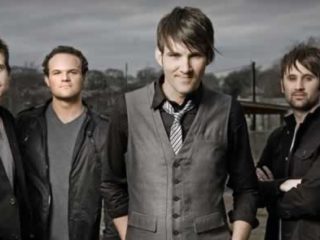An Interview with Ben Fielding
We sat down with worship leader, Ben Fielding, from Hillsong Worship.
Ben is a Hillsong worship leader, songwriter, and pastor at Hillsong Sydney. Fielding has written many worship songs such as “God is Able,” “The Lost Are Found,” or “Oceans will Part,” to name a few.
Ben, tell me about the Hillsong Worship Tour…
It’ a three-week tour, and so far, it’s been incredible. Every night has built upon the last. We were in Cincinnati (technically Kentucky, I think!) last night; tonight, Chicago. But one thing I’ve observed throughout this whole trip is that no matter where we start, the nights all finish the same. I believe when a person gives a night to seeking God, God reveals his character to that person. The Bible says if we draw near to him, he draws near to us. I love seeing God revealing himself to people.
I never want to lose sight of the fact each individual is there in God’s timing, and God loves every single one of them.
Can you actually see what’s going on in the audience?
Absolutely! Every night I keep my eye on certain people, watching how they respond throughout the evening. Normally I’ll find someone who’s really enthusiastic — that’s my go-to person if I need a bit of encouragement [laughs]. But I also seek out somebody who looks a bit out of place, someone who’s not sure what he or she is doing there. By the end of the night, I often see how people who may never have been inside a church before have been impacted by all that’s going on. I never want to lose sight of the fact each individual is there in God’s timing, and God loves every single one of them.
Before we go on stage, we pray that God will do what only he can do. Only God can work permanent change in someone — the kind of change we’ve experienced as believers. We can do the hard work of preparing for the night, but that’s the one element we can’t control. We have to trust that God wants to meet with people, that he wants to change the lives of people, that he wants to impact people even more than we want to. He’s true to his promises.
I love the new album, No Other Name.
We released No Other Name in July, and we’re so excited about it. And that’s the whole theme of the album, really — and for our church this year too. It’s never meant to be about promoting the name of Hillsong or the names of individuals, but about promoting only Jesus. Despite what divides us as Christians, the thing that unites us is greater — and that’s the name of Jesus. We worship under no other name, we come together under no other name. Not in the name of our denominations, our countries, our churches, but only under the name of Jesus.
Earlier this year, after we’d thrown out ideas to name this project and nothing made sense, someone suggested No Other Name after one of the songs on the album. Then our communications guy said, “Imagine if we could book Times Square in New York! And among all these brands, all these names competing for our attention, we could display on the screens only the name Jesus.” We all said, “That’s an awesome idea, but it’s never going to happen.” However, he looked into it and discovered we actually could book the Times Square screens. So we did, for something like ten minutes — all we could afford. But when our team got there to perform, the screens weren’t working . . . nothing came on. We got a call the next morning from the company who runs the screens. They apologized and offered to add more screens and give us an hour of prime time! So we ended up packing out Times Square. And for an hour, there was no other name being displayed in Times Square but that of Jesus. It was incredible.
I’m blown away by your social popularity (Twitter, Facebook), I’m curious why you have this kind of influence.
It’s remarkable. Our senior pastor, Brian Houston, says people come to Hillsong and tell him he’s a marketing genius, but he replies, “No, I’m a pastor. I have no sense about marketing.” [Laughs.] It’s the grace of God. There’s a lot of it you can’t explain.
But I do believe Brian’s vision for our church has played an important part. About 25, 30 years ago, he wrote The Church That I See, basically a vision statement for Hillsong’s potential. In it Brian wrote that he envisioned a church of influence, a church so significant, so large, that the city couldn’t deny it. At the time, Hillsong was a very small local church in Sydney and this statement was kind of ridiculous. Yet obviously that statement is true in our city today — and even around the world. There’s something to be said for having the godly confidence to say, if Jesus is building his church, he can bring about this influence. The church can be a voice and a light not only to the immediate community but to a much broader community.
How did you get started in this crazy business called worship?
I grew up in a family that valued the local church and community of believers. I think I caught my passion for worship because my parents valued it. I started playing music when I was young and was fortunate to be part of a local church where the music director believed enough in me to give me a chance to play in the worship band.
As I got older, I starting leading worship and writing music. But the turning point was ten years ago, when I got involved with Hillsong, my home church now. I entered an environment that had such a passion for worship and the role of song, in particular, in edifying the church. I’ve been incredibly inspired by that. And then to be able to go out on the road and discover that a worship song written in someone’s living room and then sung in my local church is being used by God to bless and reveal himself to others on the other side of the world, such as in Chicago . . . it’s mind-blowing.
You’re married with a family, right?
Yes, my wife and I have been married seven years, and we have a two-year-old son.
Tell me about the work-marriage balance in your life.
Well, I’m not on the road as often as you’d think. But sometimes I think the whole concept of balance can be somewhat misleading, because balance is not always possible. Obviously I’m away from home for three weeks. There’s no balance here — I’m just not at home. I’m not getting time with my family. But when I think of this balancing act in terms of a season, it’s easier to handle. I’m away for a season, and then I’ll be home for a long season. This perspective has helped my wife and me.
We’ve also learned to prepare, to plan, for these seasons, even just mentally saying, This is what the year’s going to look like.. We took a holiday — my wife, son, and I — before I left for this trip, and it was a great time together as a family. After these three weeks are over, I’ll be home pretty much until the end of the year. So it’s planning, preparation, and then trying to do the basic things — such as communication — well while I’m gone.
My wife and I are looking forward to the fact that when this period’s up, we’ll get time together. We’ll be very intentional about using that time, because you can’t replace the time you lose.
What we’ve discovered through the years is that prayer is imperative — and not just prayer for our lives, but for those around us and for the circumstances of our day.
How do you and your wife express your spiritual intimacy?
When my wife and I were first married, we explored spiritual intimacy on foundational level. We read Scripture and prayed together. And to this day we still do that. But what we’ve discovered through the years is that prayer is imperative — and not just prayer for our lives, but for those around us and for the circumstances of our day. One of the things — my wife is incredible; I wish she were here doing this interview with me . . .
I was wishing she were here too . . .
She could rebut everything I’m saying [laughs]!
But one of the things we’ve been talking about lately is trying to make sure that when we communicate about our day, we’re not just saying “I did this,” or “I did that.” We’re looking for those moments where we can actually engage on an intimate level. I want to be able to get a glimpse into my wife’s world in a way that goes beyond task-driven . . . to learn how she’s responded to the people with whom she’s been in contact. The ability to debrief on that, and to pray through circumstances and for friends together, have been invaluable to our spiritual intimacy.
We don’t want to keep our marital spirituality private. We want to be able to pray for the friends who come around, for whatever they’re going through. I don’t think we can dissociate our spirituality from our relationships. The key is being intentional.
What do you want your son to know about worship?
First and foremost, I want my son to realize that worship is our response to God displaying who he is. And it’s a response that encompasses all of life. I want to make sure my son’s not under the false assumption that worship is about a particular type of song but that worship is what we do as Christians. Worship is about bringing glory to God in response to God displaying to us his glory. And that takes many shapes.
I also would love for my son to appreciate the importance of corporate worship, because throughout the history of the church, worship has been imperative in unifying the church around what it believes to be most true. The Bible says that if we agree together in Jesus’ name, then the presence of God is there. There’s something special about the agreement of the church. I don’t know if there’s anything more powerful than when we’re all confessing the same together, whether it’s through song or liturgy or a common confession of faith.
Copyright © 2014 Growthtrac Ministries





 Jim is the founder, with wife,
Jim is the founder, with wife, 








